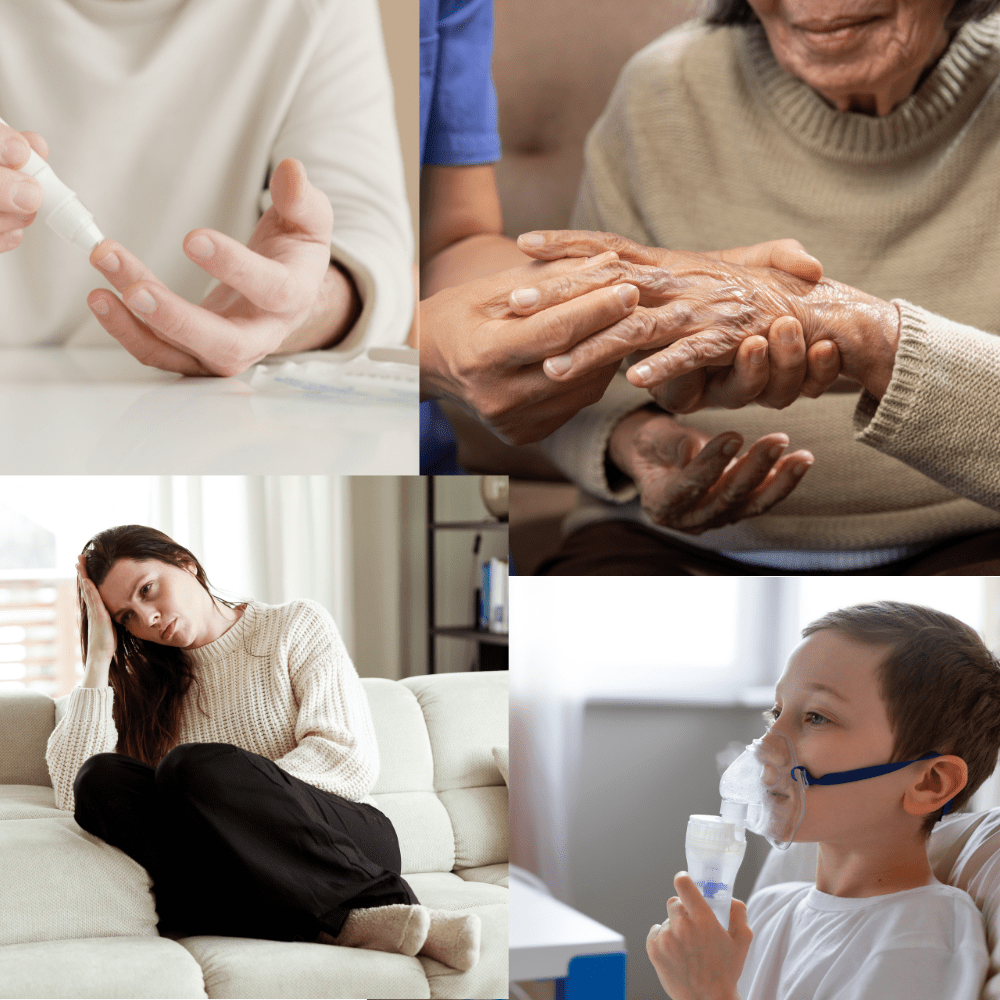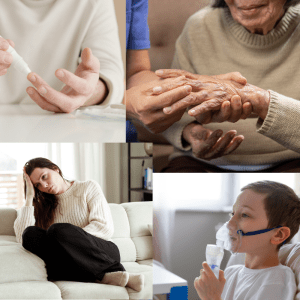
by Beth Ayers, Family Support Training Coordinator
July 8, 2025
Chronic Disease Awareness Day is observed annually on July 10 and was created to increase the public’s understanding of chronic diseases and illnesses, promote advocacy for better healthcare access, and support those living with chronic illnesses and their families.
According to the Centers for Disease Control and Prevention (CDC), “Chronic diseases are defined broadly as conditions that last 1 year or more and require ongoing medical attention or limit activities of daily living or both. Chronic diseases such as heart disease, cancer, and diabetes are the leading causes of death and disability in the United States. They are also leading drivers of the nation's $4.5 trillion in annual health care costs. 6 in 10 Americans have at least one chronic disease, and 4 in 10 have two or more chronic diseases. Many preventable chronic diseases are caused by a short list of risk behaviors: smoking, poor nutrition, physical inactivity, and excessive alcohol use. Some groups are at higher risk of chronic diseases because of conditions where they are born, live, work, and age. These nonmedical factors, called social determinants of health, can be positive or negative. When they are negative, they limit the opportunities to make healthy choices and get good medical care. For example, some communities lack safe spaces like parks for people to be active, or grocery stores that sell fresh fruits and vegetables. In some rural areas, it's hard to get medical care because of doctor shortages, hospital closures, or long distances to care. This makes it challenging to get preventive screenings or specialist follow-up care.”
Other common chronic conditions include hypertension, high cholesterol, arthritis, obesity, depression and other mental health disorders, chronic respiratory diseases such as COPD, chronic kidney disease, chronic liver disease, Alzheimer’s disease and other types of dementia, and asthma. Causes of chronic disease can be genetics, lifestyle choices, and environmental factors. Other risk factors besides the previously mentioned ones of smoking, poor nutrition, physical inactivity, and excessive alcohol use include age, family history of disease, exposure to environmental toxins and pollution, chronic stress, and lack of sleep.
 Mental health conditions, including depression, are often not thought of as chronic diseases or illnesses. The National Council on Aging in their article The Top 10 Most Common Chronic Conditions in Older Adults writes about depression, “15% of older adults have depression—a treatable medical condition that is not a normal part of aging. Depression causes persistent feelings of sadness, pessimism, hopelessness, fatigue, difficulty making decisions, changes in appetite, a loss of interest in activities, and more.” The article goes on to list steps that can be taken to help with depression such as managing stress through social support or meditation, eating healthy foods which can positively affect your mood, exercising for both physical and psychological benefits, and talking with professionals including a primary care doctor, therapist, or psychiatrist.
Mental health conditions, including depression, are often not thought of as chronic diseases or illnesses. The National Council on Aging in their article The Top 10 Most Common Chronic Conditions in Older Adults writes about depression, “15% of older adults have depression—a treatable medical condition that is not a normal part of aging. Depression causes persistent feelings of sadness, pessimism, hopelessness, fatigue, difficulty making decisions, changes in appetite, a loss of interest in activities, and more.” The article goes on to list steps that can be taken to help with depression such as managing stress through social support or meditation, eating healthy foods which can positively affect your mood, exercising for both physical and psychological benefits, and talking with professionals including a primary care doctor, therapist, or psychiatrist.
Managing the physical, mental, and emotional toll of chronic diseases can be isolating for both the individual and their family. As people in recovery and parents/caregivers of children with special healthcare needs including behavioral health, we know firsthand the feelings of frustration, isolation, despair, and hopelessness. We know the challenges of finding treatment and advocating to be heard. We know the hope in finding joy and meaning living with chronic health conditions. The following data is from West’s report titled Strengthening Chronic Care: Patient Engagement Strategies For Better Management of Chronic Conditions and resonated with me as a parent of children with behavioral health challenges and as a Family Peer Supporter:
- Approximately 1 in 5 patients feel anxious (21%) or frustrated (20%) dealing with their disease.
- 26% of patients experience physical exhaustion after being diagnosed with a chronic condition. 24% of patients feel angry upon being diagnosed with a chronic condition. 23% of patients have difficulty sleeping after receiving a chronic disease diagnosis.
- 70% of patients with a chronic condition want more resources or clarity to help manage their disease. 91% of patients say they need help managing their disease.
- 88% of patients who want assistance managing their condition say help with their treatment would make a difference in their overall state of health.
Children’s Hospital of Colorado’s online resource Parent Toolkit: Parenting a Child With a Chronic Illness begins by stating, “Parenting a child with chronic illness can be a challenge for the entire family. Emotions like anger, sadness and worry, paired with invasive medical procedures, medication side effects and disruptions to family routine, can lead to a volatile mix at home.” The resource goes on to share the importance of “good parenting” despite the child’s illness. “Amid the stress and strain of chronic illness, it’s tempting to let challenging behavior and emotional outbursts slide. But like all children, children with chronic illness do best when held to standards of behavior, appropriate discipline and consistent limits.” The article goes on to list how a parent can best support their child:
- Communicate openly
- Maintain a schedule
- Establish limits and behavioral expectations
- Use appropriate and consistent discipline
- Promote treatment adherence
- Avoid power struggles
- Take care of yourself
- Help your child cope
- Work closely with the school
Just reading the list and the accompanying “tips” for each one left me feeling overwhelmed and patronized. In trying to keep my child alive and fight everyone (hospitals, doctors, insurance companies, school administration, treatment centers, government entities) for proper services, I had little time, energy, or mental capacity left for “everyday” parenting. Yes, the above list holds with my values and are things I would have liked to be able to focus on. Well-meaning advice from articles, professionals, family and friends often left me feeling defeated, overwhelmed, and a failure as a parent. What I could have used were meals, offers to babysit my other child, grace, encouragement, coffee, and non-judgmental support. This is why I am an advocate for peer support. The writers of this article and the people in my life without children with chronic illnesses have the best of intentions and want to help but cannot offer the empathy and support that someone with lived experience can.
At the end of this article is a link to Parent Toolkit: Strategies for Maximizing your Child's Health- A toolkit for parents of children who are chronically ill with this picture:
I don’t know about other parents with chronically ill children, but my trips to the hospital did not look like this! However, I feel The Parent Toolkit’s opening paragraph does reflect my reality, “Having a child diagnosed with a chronic illness alters every aspect of a family’s life. Besides the procedures and medical appointments, the paperwork, the uncertainty, the disruption to work and school, there’s also the fact that your child is sick. That’s a hard thing to accept. Caring for a chronically ill child can feel stressful and time-consuming, and parenting decisions that used to be easy can suddenly feel very hard.”
Whether you have a chronic disease or illness or are the parent or caregiver of a child who has a chronic disease, you are not alone. There are others with similar lived experiences ready to support you. Reach out to Montana’s Peer Network or visit our website. You can also find more information at Chronic Disease Awareness Day.